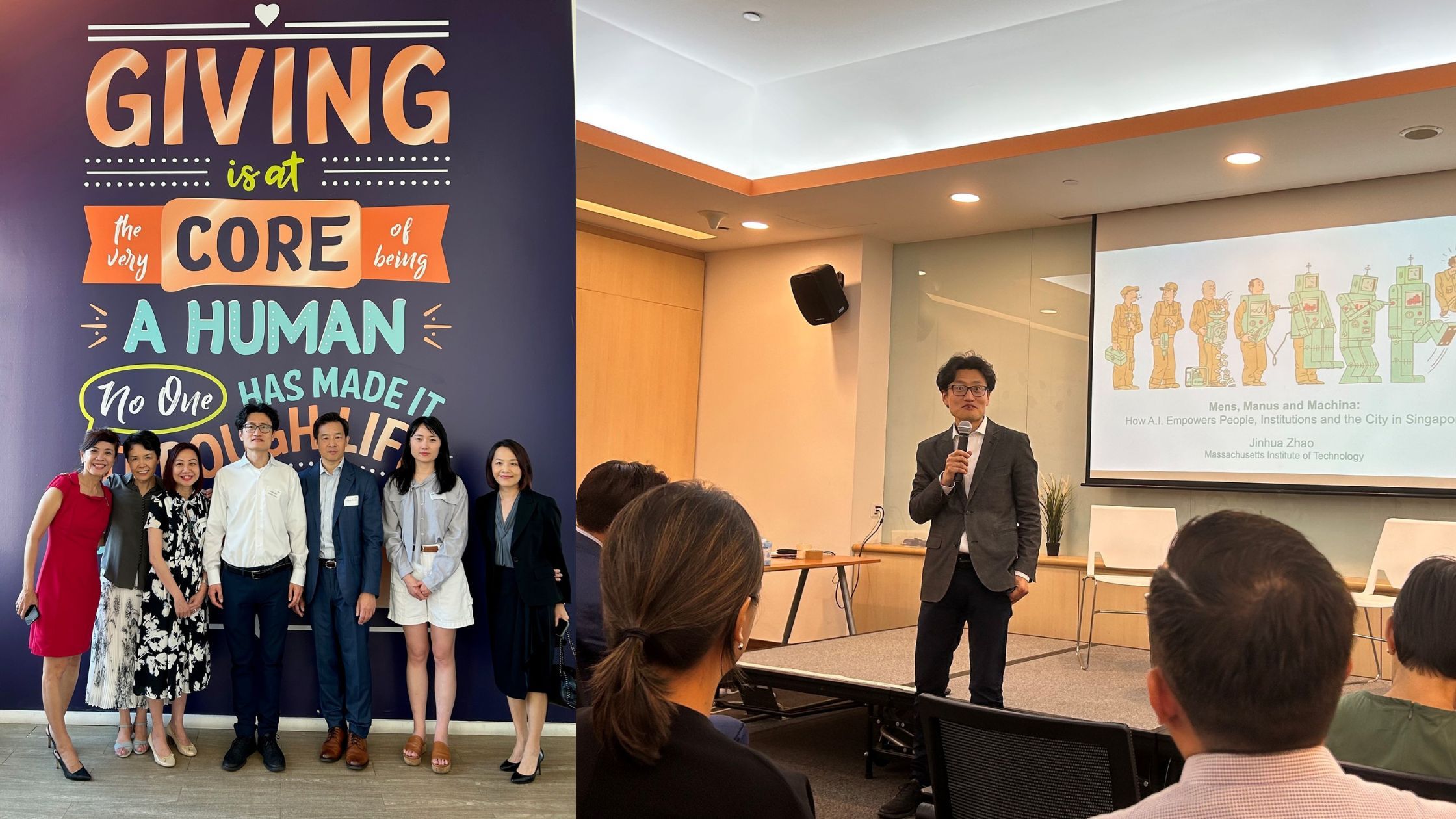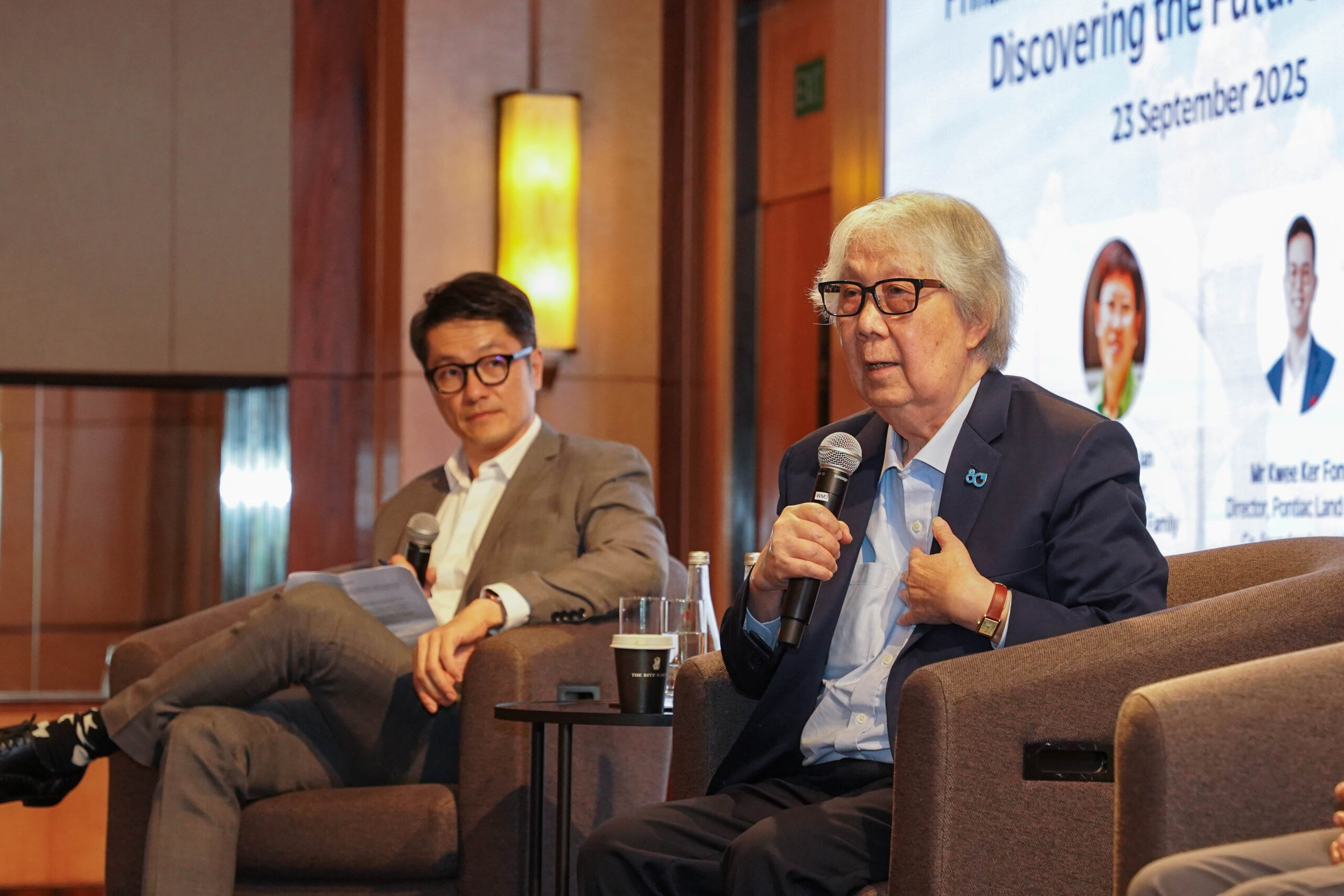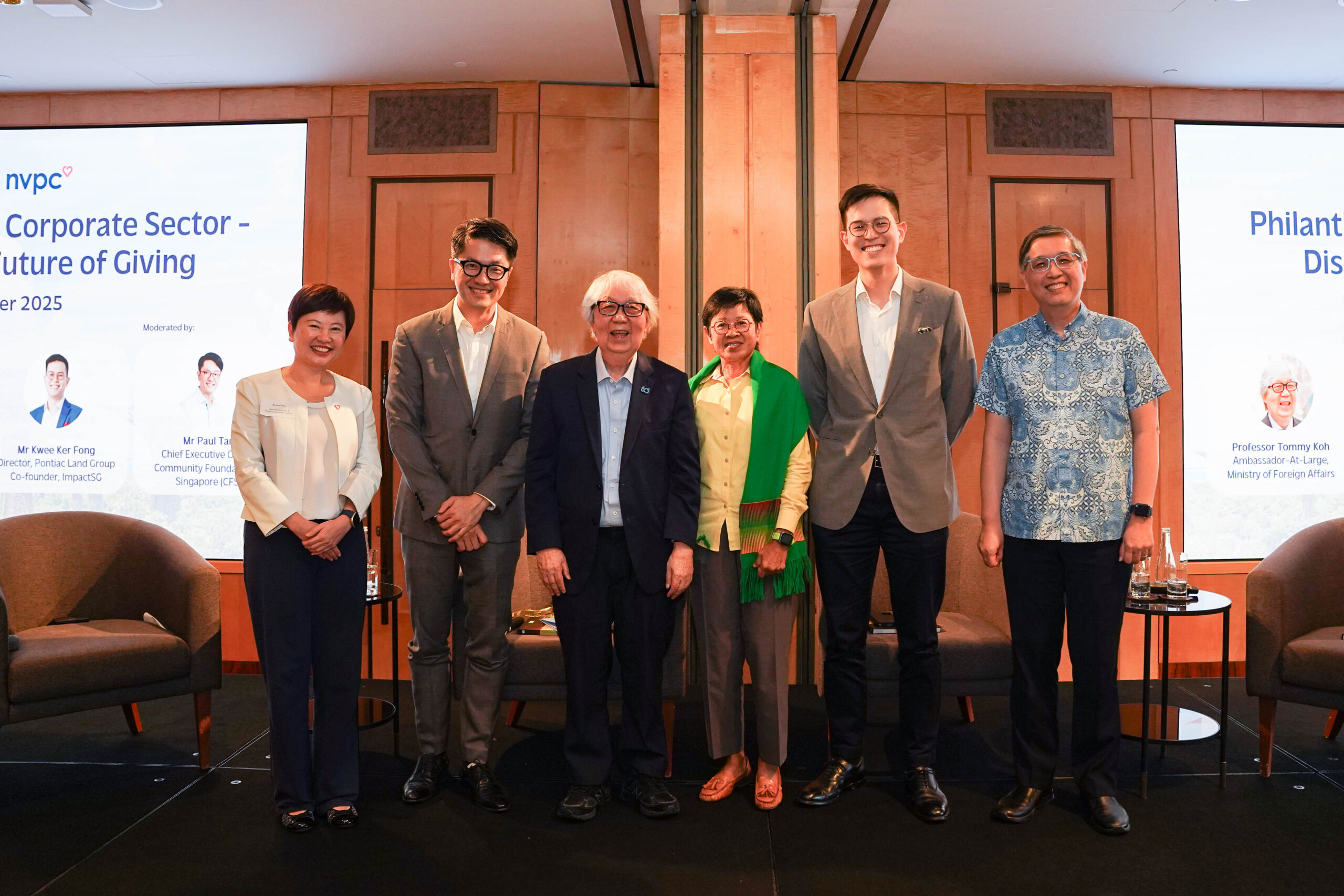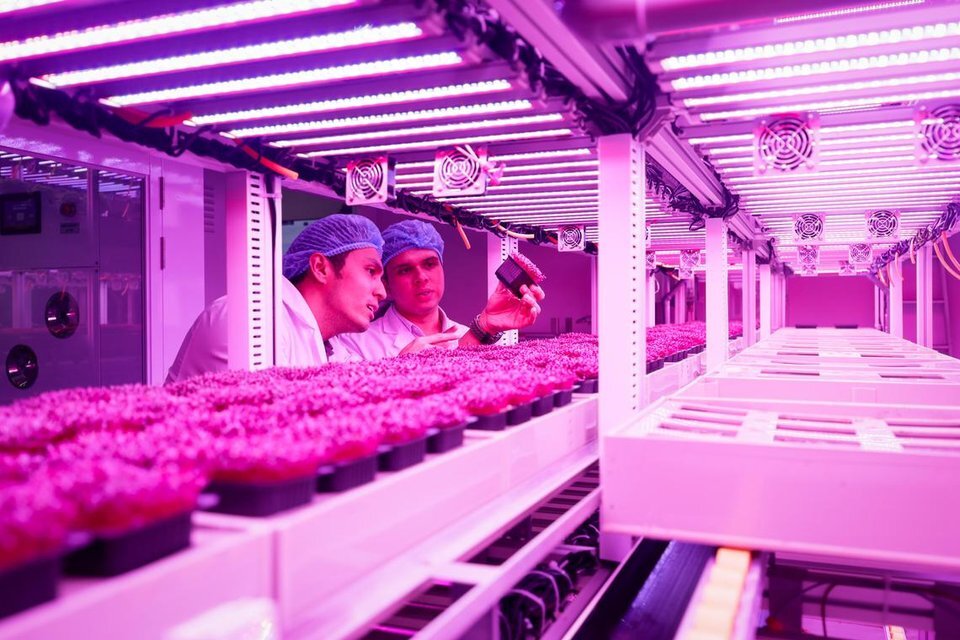CFS Change Matters Series: Mens, Manus and Machina – How AI Empowers People, Institutions & the City in Singapore


Artificial intelligence (AI) will be a disruptive influence on society, for good as well as ill – and there is a duty to provide a sense of hope, upfront, that humans will be able to prevail.
That was the core message of the inaugural CFS Change Matters Series talk, “Mens, Manus and Machina – How AI Empowers People, Institutions & the City in Singapore”. It was delivered on 21 June 2023 by Professor Jinhua Zhao, Associate Professor of Transportation and City Planning at the Massachusetts Institute of Technology (MIT).
“Mens”, “manus” and “machina” are Latin for “mind”, “hand”, and “machine” respectively, and the title plays on MIT’s motto, “mens et manus”. The title of the talk is also the name of a multi-disciplinary collaborative project between MIT and Singapore’s National Research Foundation. The collaboration is co-led by Prof Zhao, and aims to address the following questions:
- How will we design technology and train humans to build the skills and habits for human success in a robotics-heavy environment?
- How will we adapt our social and business institutions to create the incentives and protections for innovation and human welfare?
In his talk, Prof Zhao shared four key insights into AI.
1. AI will transform, rather than reduce, demand for workers
Enablement, not elimination, of workers
The aftermath of the Industrial Revolution (1760-1840) saw the rise of the machine, leading to a major change in the way we worked. This did not, however, reduce overall demand for workers.
Citing economist James Bessen, 1 Prof Zhao noted that the number of ATMs in the USA grew rapidly from the 1970s, when the first ATMs were installed in banks. However, the role of the bank teller was not eliminated, but enabled. Bank tellers now focused on value-added services centered on human interactions, which could not be replaced by ATMs. As such, the number of bank tellers increased.
Employment grows along with automation
While automation has led to displacement and job loss, there has historically not been a fall in overall employment. Increased productivity from automation, as well as the growth of new human desires over time, have created entirely new jobs and industries.
This has led to an overall increase in employment; in fact, the 2018 US Census counted that more than 60% of jobs in 2018 had not yet been “invented” in 1940.
2. AI is not all the same
Expert versus Learning Systems
AI systems generally fall into two categories: expert systems and learning systems.
- Expert systems rely on predefined rules and a knowledge base to mimic the expertise of specialists.
- Learning systems, such as machine learning, mimic the way the brain learns and processes information.
Discriminative versus Generative Models
In addition, AI systems mainly adopt either a discriminative or a generative model in relation to their inputs.
- Discriminative models classify or discriminate between different inputs, based on their features.
- Generative models learn the patterns and relationships within the data input to generate new samples that resemble the original data.
The ubiquitous ChatGPT, for example, is a Large Language Model, an example of a generative model AI that can produce human-like chat responses.
3. The real impacts of AI on society
AI will replace white-collar jobs, not blue-collar jobs
While the Industrial Revolution replaced manual workers, AI’s superior analytic and generative skills enable it to replace white-collar jobs like office workers and scientists.
For example, a Google-developed AI known as AlphaFold was able to significantly outperform human scientists in the field of protein structure prediction – a feat normally requiring decades of expertise from humans.
As such, it is “highly skilled” white-collar jobs that may be at risk from AI – a concerning proposition for developed economies that depend heavily on these jobs.
The response of social institutions will determine the impacts of AI
The impact of AI does not occur in a vacuum. Tapping the beneficial impacts of AI on living standards depends on how successfully social institutions can take advantage of it. For example, society must continue to be responsible for providing financial safety nets for those displaced by AI, and for caring for seniors who may find it harder to adapt.
These institutions must also respond to not just the economic challenges, but the social challenges of AI. Citing the intellectual Yuval Noah Harari, Prof Zhao noted that generative AI, for example, could destroy the ability for people to have meaningful conversations – and undermine democracy in the process.2
4. Science, government, and individuals can respond to AI productively
Science can help us control AI
Science must solve the alignment problem3 in order to develop beneficial AI – which takes only actions that achieve human objectives and preferences. Otherwise, AI could unintentionally act in a way that is destructive and harmful to humanity.
Governments can educate humans to fill areas that AI cannot
While AI is powerful, it is not superior to humans in all areas. Humans are better than AI at:
- Creativity: being able to apply knowledge from one area to another area
- Dexterity: tasks involving manual dexterity
- Social intelligence: conducting “social negotiations” with humans, such as knowing when it is safe to turn while driving
- Long-term planning: being able to break long-term plans (e.g. a 5-year plan) into shorter increments
With that in mind, governments should focus education on creativity and communication, as well as critical thinking: the ability to judge, and to ask the right questions. This prepares students to become evaluators, directors and planners, instructing AI to act on their goals.
The role of teachers will also change as AI evolves and becomes deployable at scale as an individual, customized teaching assistant. AI will enhance students’ learning and help teachers understand students; teachers will be tasked with socially engaging, empathizing with, and supervising students, rather than merely delivering content.
Individuals can change their mindsets to be resilient in the face of AI
Finally, the impact of AI, and job displacement, on individuals will not purely be economic. It will be personal as well, given how central work is to our social and emotional lives, and to our sense of purpose.
Individuals can make the following mindset changes, in order to be resilient:
- Adopting a lifelong learning mindset: this means developing new skills while working, rather than focusing on academic learning as preparation for work.
- Adopting a flexible mindset: understanding that while change is the new normal, humans have always had the capacity to adapt. This is especially important for youths.
Final thoughts: how philanthropy can respond to AI
Philanthropists reading this may wonder: how do I respond to the challenges posed by AI? CFS is Singapore’s first community foundation, with 15 years of experience and a network of over 400 charity partners. We leverage our experience and grantmaking expertise to identify and evaluate key opportunities for individual and corporate donors to make greater impact.
We think the following giving approaches may be valuable to respond to AI:
- Supporting seniors to age well in the community, so they remain cared for and are not left behind.
- Enabling youths to access quality education, through schools and Institutions of Higher Learning, and prepare for the AI-empowered future.
- Funding efforts to improve employability, so that individuals develop the skills they need to keep working.
- Ensuring that mental wellbeing is supported, to help individuals build the resilience to cope with changes.
- Tackling climate and environment issues, to mitigate and adapt to this additional source of negative disruption.
To find out more about CFS and our leading role in Singapore’s philanthropy ecosystem, please click here.
CFS would like to extend our heartfelt gratitude to our donors Oliver Kwan and Helen He from the Evergreen Changemaker Fund for their invaluable support and extending the invitation to Prof Zhao, which made this event possible.
References
1 Bessen, James. “Toil and Technology.” Finance & Development 52, no. 1 (March 2015): 16–19. https://www.imf.org/external/pubs/ft/fandd/2015/03/pdf/bessen.pdf.
2 “Yuval Noah Harari Argues That AI Has Hacked the Operating System of Human Civilisation,” The Economist, April 28, 2023, https://www.economist.com/by-invitation/2023/04/28/yuval-noah-harari-argues-that-ai-has-hacked-the-operating-system-of-human-civilisation.
3 The problem of aligning AI with humans’ objectives and values.
Artificial intelligence (AI) will be a disruptive influence on society, for good as well as ill – and there is a duty to provide a sense of hope, upfront, that humans will be able to prevail.
That was the core message of the inaugural CFS Change Matters Series talk, “Mens, Manus and Machina – How AI Empowers People, Institutions & the City in Singapore”. It was delivered on 21 June 2023 by Professor Jinhua Zhao, Associate Professor of Transportation and City Planning at the Massachusetts Institute of Technology (MIT).
“Mens”, “manus” and “machina” are Latin for “mind”, “hand”, and “machine” respectively, and the title plays on MIT’s motto, “mens et manus”. The title of the talk is also the name of a multi-disciplinary collaborative project between MIT and Singapore’s National Research Foundation. The collaboration is co-led by Prof Zhao, and aims to address the following questions:
- How will we design technology and train humans to build the skills and habits for human success in a robotics-heavy environment?
- How will we adapt our social and business institutions to create the incentives and protections for innovation and human welfare?
In his talk, Prof Zhao shared four key insights into AI.
1. AI will transform, rather than reduce, demand for workers
Enablement, not elimination, of workers
The aftermath of the Industrial Revolution (1760-1840) saw the rise of the machine, leading to a major change in the way we worked. This did not, however, reduce overall demand for workers.
Citing economist James Bessen, 1 Prof Zhao noted that the number of ATMs in the USA grew rapidly from the 1970s, when the first ATMs were installed in banks. However, the role of the bank teller was not eliminated, but enabled. Bank tellers now focused on value-added services centered on human interactions, which could not be replaced by ATMs. As such, the number of bank tellers increased.
Employment grows along with automation
While automation has led to displacement and job loss, there has historically not been a fall in overall employment. Increased productivity from automation, as well as the growth of new human desires over time, have created entirely new jobs and industries.
This has led to an overall increase in employment; in fact, the 2018 US Census counted that more than 60% of jobs in 2018 had not yet been “invented” in 1940.
2. AI is not all the same
Expert versus Learning Systems
AI systems generally fall into two categories: expert systems and learning systems.
- Expert systems rely on predefined rules and a knowledge base to mimic the expertise of specialists.
- Learning systems, such as machine learning, mimic the way the brain learns and processes information.
Discriminative versus Generative Models
In addition, AI systems mainly adopt either a discriminative or a generative model in relation to their inputs.
- Discriminative models classify or discriminate between different inputs, based on their features.
- Generative models learn the patterns and relationships within the data input to generate new samples that resemble the original data.
The ubiquitous ChatGPT, for example, is a Large Language Model, an example of a generative model AI that can produce human-like chat responses.
3. The real impacts of AI on society
AI will replace white-collar jobs, not blue-collar jobs
While the Industrial Revolution replaced manual workers, AI’s superior analytic and generative skills enable it to replace white-collar jobs like office workers and scientists.
For example, a Google-developed AI known as AlphaFold was able to significantly outperform human scientists in the field of protein structure prediction – a feat normally requiring decades of expertise from humans.
As such, it is “highly skilled” white-collar jobs that may be at risk from AI – a concerning proposition for developed economies that depend heavily on these jobs.
The response of social institutions will determine the impacts of AI
The impact of AI does not occur in a vacuum. Tapping the beneficial impacts of AI on living standards depends on how successfully social institutions can take advantage of it. For example, society must continue to be responsible for providing financial safety nets for those displaced by AI, and for caring for seniors who may find it harder to adapt.
These institutions must also respond to not just the economic challenges, but the social challenges of AI. Citing the intellectual Yuval Noah Harari, Prof Zhao noted that generative AI, for example, could destroy the ability for people to have meaningful conversations – and undermine democracy in the process.2
4. Science, government, and individuals can respond to AI productively
Science can help us control AI
Science must solve the alignment problem3 in order to develop beneficial AI – which takes only actions that achieve human objectives and preferences. Otherwise, AI could unintentionally act in a way that is destructive and harmful to humanity.
Governments can educate humans to fill areas that AI cannot
While AI is powerful, it is not superior to humans in all areas. Humans are better than AI at:
- Creativity: being able to apply knowledge from one area to another area
- Dexterity: tasks involving manual dexterity
- Social intelligence: conducting “social negotiations” with humans, such as knowing when it is safe to turn while driving
- Long-term planning: being able to break long-term plans (e.g. a 5-year plan) into shorter increments
With that in mind, governments should focus education on creativity and communication, as well as critical thinking: the ability to judge, and to ask the right questions. This prepares students to become evaluators, directors and planners, instructing AI to act on their goals.
The role of teachers will also change as AI evolves and becomes deployable at scale as an individual, customized teaching assistant. AI will enhance students’ learning and help teachers understand students; teachers will be tasked with socially engaging, empathizing with, and supervising students, rather than merely delivering content.
Individuals can change their mindsets to be resilient in the face of AI
Finally, the impact of AI, and job displacement, on individuals will not purely be economic. It will be personal as well, given how central work is to our social and emotional lives, and to our sense of purpose.
Individuals can make the following mindset changes, in order to be resilient:
- Adopting a lifelong learning mindset: this means developing new skills while working, rather than focusing on academic learning as preparation for work.
- Adopting a flexible mindset: understanding that while change is the new normal, humans have always had the capacity to adapt. This is especially important for youths.
Final thoughts: how philanthropy can respond to AI
Philanthropists reading this may wonder: how do I respond to the challenges posed by AI? CFS is Singapore’s first community foundation, with 15 years of experience and a network of over 400 charity partners. We leverage our experience and grantmaking expertise to identify and evaluate key opportunities for individual and corporate donors to make greater impact.
We think the following giving approaches may be valuable to respond to AI:
- Supporting seniors to age well in the community, so they remain cared for and are not left behind.
- Enabling youths to access quality education, through schools and Institutions of Higher Learning, and prepare for the AI-empowered future.
- Funding efforts to improve employability, so that individuals develop the skills they need to keep working.
- Ensuring that mental wellbeing is supported, to help individuals build the resilience to cope with changes.
- Tackling climate and environment issues, to mitigate and adapt to this additional source of negative disruption.
To find out more about CFS and our leading role in Singapore’s philanthropy ecosystem, please click here.
CFS would like to extend our heartfelt gratitude to our donors Oliver Kwan and Helen He from the Evergreen Changemaker Fund for their invaluable support and extending the invitation to Prof Zhao, which made this event possible.
References
1 Bessen, James. “Toil and Technology.” Finance & Development 52, no. 1 (March 2015): 16–19. https://www.imf.org/external/pubs/ft/fandd/2015/03/pdf/bessen.pdf.
2 “Yuval Noah Harari Argues That AI Has Hacked the Operating System of Human Civilisation,” The Economist, April 28, 2023, https://www.economist.com/by-invitation/2023/04/28/yuval-noah-harari-argues-that-ai-has-hacked-the-operating-system-of-human-civilisation.
3 The problem of aligning AI with humans’ objectives and values.
- Related Topics For You: ACCESSING QUALITY EDUCATION, AGEING WELL, CLIMATE & ENVIRONMENT, DONOR STORIES, EVENTS, IMPROVING EMPLOYABILITY, MENTAL WELLBEING


